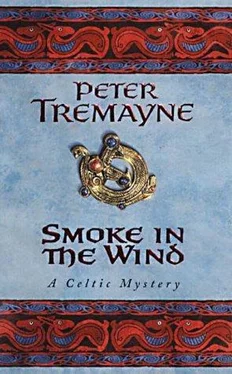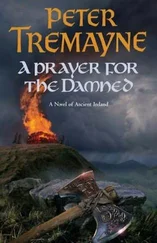Peter Tremayne - Smoke in the Wind
Здесь есть возможность читать онлайн «Peter Tremayne - Smoke in the Wind» весь текст электронной книги совершенно бесплатно (целиком полную версию без сокращений). В некоторых случаях можно слушать аудио, скачать через торрент в формате fb2 и присутствует краткое содержание. Жанр: Исторический детектив, на английском языке. Описание произведения, (предисловие) а так же отзывы посетителей доступны на портале библиотеки ЛибКат.
- Название:Smoke in the Wind
- Автор:
- Жанр:
- Год:неизвестен
- ISBN:нет данных
- Рейтинг книги:5 / 5. Голосов: 1
-
Избранное:Добавить в избранное
- Отзывы:
-
Ваша оценка:
- 100
- 1
- 2
- 3
- 4
- 5
Smoke in the Wind: краткое содержание, описание и аннотация
Предлагаем к чтению аннотацию, описание, краткое содержание или предисловие (зависит от того, что написал сам автор книги «Smoke in the Wind»). Если вы не нашли необходимую информацию о книге — напишите в комментариях, мы постараемся отыскать её.
Smoke in the Wind — читать онлайн бесплатно полную книгу (весь текст) целиком
Ниже представлен текст книги, разбитый по страницам. Система сохранения места последней прочитанной страницы, позволяет с удобством читать онлайн бесплатно книгу «Smoke in the Wind», без необходимости каждый раз заново искать на чём Вы остановились. Поставьте закладку, и сможете в любой момент перейти на страницу, на которой закончили чтение.
Интервал:
Закладка:
Gwlyddien was obviously not accustomed to being questioned so directly and the abbot was looking anxious. However, Gwlyddien kept his humour.
‘Believe me, Fidelma of Cashel, I am not an idle flatterer.’
‘Of that I am sure,’ Fidelma replied quickly. ‘So let us get down to what it is that you want of us rather than proceed with the inconsequential matters.’
At a gesture from the king, Abbot Tryffin took charge of the narrative.
‘Some twenty or more kilometres to the north of here is one of our sub-houses, the abbey of Llanpadern. Abbey is, perhaps, too important a title to give the little community that dwells there.’
When he paused, Gwlyddien exhaled in exasperation. The abbot continued hurriedly.
‘One of our brethren, Brother Cyngar, was journeying here from his community. His route took him to Llanpadern where he had planned to ask for hospitality on his way. Brother Cyngar arrived here yesterday in a state of great consternation and anxiety. He is young and impressionable. It appears, from what he tells us, that when he arrived at Llanpadern it was deserted. Completely deserted.’
He sat back as if expecting some reaction to his statement.
After a pause, Fidelma asked casually: ‘How many normally live in this abbey of Llanpadern?’
‘It is a male house of twenty-seven brothers. They work the land and run a small farm and are thus self-sustaining. ’
Fidelma’s eyes widened a little. ‘Twenty-seven? Was that figure chosen deliberately?’
Abbot Tryffin was puzzled and said so.
‘Then it is of no consequence if it needs to be explained,’ Fidelma said dismissively. In her culture, the number had a mystic symbolism. ‘So Brother Cyngar found the abbey deserted and, presumably, could discover no explanation which accounted for its being abandoned?’
‘He could not.’
‘Did he examine all the buildings thoroughly?’
‘He did. He found that candles were lit, food was on the tables, half eaten, but the place had been deserted for some hours. The rats were quite noticeable. But even the livestock were all gone.’
Fidelma turned to Gwlyddien with a sharp look of interrogation. ‘And why is it that this case particularly interests you?’
The elderly king blinked in surprise. ‘What makes you say that it does?’ he demanded.
‘I am interested in why the king of Dyfed is so concerned with this small religious community and its fate. Such inquiries could easily be left to your abbot here. But you seem overly concerned in soliciting our help.’
The king sat back, blinking a little at her directness. ‘You have a sharp mind; a keen perception. It is true, Fidelma of Cashel, that I am particularly interested in the fate of this community.’ He hesitated, as if trying to organise his thoughts into an articulate form.
‘I have a son, my eldest son, Rhun. Rhun decided to enter the community of Llanpadern about six months ago. He was a bright lad. I once thought him ambitious for this kingdom, ambitious to succeed me one day. But then he became frustrated with his life and decided to join the religious.’
Fidelma leant forward a little in her chair. ‘And your son, Rhun, is among the brethren who are now missing from Llanpadern?’
‘That is so.’
There was a brief silence and then Fidelma asked: ‘Do you have any thoughts on this matter, Gwlyddien?’
The elderly man shook his head. ‘I do not believe in sorcery, Sister Fidelma. I have to ask the question: other than sorcery, how else can an entire community vanish into thin air?’
Fidelma smiled wryly. ‘And do you think you have an answer to that question?’
‘There is an answer.’
They all turned at the strange commanding voice that interrupted. A young man stood at the door, which he had opened unobserved. He was tall, with fair hair fixed in place by a silver circlet. The handsome features echoed those of Gwlyddien, the eyes reflected the striking colour of those of the king. Gwlyddien indicated him with impatience as the young man entered.
‘This is my younger son, Cathen.’
Abbot Tryffin completed the formalities by introducing Fidelma and Eadulf.
‘You say that there is an answer to the question which your father posed?’ Fidelma queried.
‘Do you know anything of the politics of this land?’ Cathen replied with a question, as he sprawled into a chair.
‘Little enough,’ conceded Fidelma.
‘During the last decade this kingdom had been under constant attack from the ambitions of our northern neighbours, the kings of Ceredigion. Their current king, Artglys, is an ambitious and ruthless man. His son and heir is hardly any better. The pair of them are evil. Once Ceredigion was ruled by the kings of Gwynedd but there was an internal struggle among its ruling dynasty. A generation or so ago King Artbodgu managed to unite Ceredigion as an independent kingdom. Since the rise of Artglys, the son of Artbodgu, Ceredigion have endeavoured to expand by raiding the territories of their neighbours. To annex the kingdom of Dyfed to Ceredigion is Artglys’s dearest ambition.’
‘How does that explain the disappearance of the community at Llanpadern?’ demanded Fidelma.
‘Ceredigion have raided our territory before and taken hostages.’
‘So you are saying that Artglys of Ceredigion is somehow responsible for what has happened? That the entire community were seized in a raid?’
‘I do not know for certain. I merely say that it is possible that the Ceredigion raided Llanpadern in order to take my brother, Rhun, as a hostage.’
‘Possible but not likely,’ his father added. ‘When Rhun went into the religious, he gave up all claim to the kingship. Why take him hostage? To use as an emotional lever against me? My enemies know that I am not so weak. My oath of kingship and the good of my people come first. As for Ceredigion raids, why, Saxon ships have also been known to raid along our shores.’
‘What is it that you expect of us?’ Fidelma asked quickly to hide Eadulf’s embarrassment at the mention of Saxon raids. ‘Solving the politics of warfare is not what we are best at.’
Abbot Tryffin appeared uncomfortable. He also did not seem to agree with Prince Cathen’s views.
‘I believe that this affair has absolutely nothing to do with Ceredigion nor with Artglys’s raids across the border. .’ He glanced at Cathen and his voice trailed off.
Fidelma intervened, seeing Cathen tensing himself for an argument. ‘You say that this place — Llanpadern — is north of here? How far from the border with Artglys’s kingdom of Ceredigion?’
‘At least another twenty kilometres or more.’
‘A raid coming some forty kilometres into your territory is a long distance for an enemy host to move unnoticed,’ Fidelma observed.
‘This might be a raid by sea; they could have come ashore on the coast which is only a few kilometres away from Llanpadern,’ Cathen insisted.
‘There is much power in the word “could”,’ Fidelma said reflectively.
The abbot had compressed his lips as if wishing to say something but uncertain whether to contradict his prince. Fidelma noticed his expression.
‘I am sure that your contribution to this matter would be welcomed, Abbot Tryffin. What point do you wish to make?’
The abbot looked even more uncomfortable but seemed to summon his courage. ‘The abbey is situated at the foot of the western slopes of Carn Gelli. If the warriors of Ceredigion made a raid on the abbey by sea, there are only a couple of places they could land. They would still have to march three kilometres from either landing place to the abbey. There are two townships on these routes and such a force would have raised some alarm. Indeed, Father Clidro and his community would have been warned of the arrival of hostile raiders in the territory long before they could reach the abbey. From the way Brother Cyngar describes the orderly way in which the abbey buildings were left, I cannot believe it was the work of warriors carrying off protesting prisoners. There was no sign of an attack, no bodies, nothing to indicate violence.’
Читать дальшеИнтервал:
Закладка:
Похожие книги на «Smoke in the Wind»
Представляем Вашему вниманию похожие книги на «Smoke in the Wind» списком для выбора. Мы отобрали схожую по названию и смыслу литературу в надежде предоставить читателям больше вариантов отыскать новые, интересные, ещё непрочитанные произведения.
Обсуждение, отзывы о книге «Smoke in the Wind» и просто собственные мнения читателей. Оставьте ваши комментарии, напишите, что Вы думаете о произведении, его смысле или главных героях. Укажите что конкретно понравилось, а что нет, и почему Вы так считаете.












